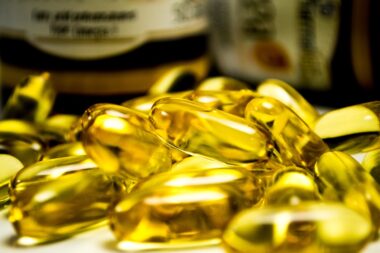The Science Behind Vitamin D Metabolism in Dogs
Vitamin D is crucial for both humans and dogs, significantly influencing calcium homeostasis and bone health. Dogs, unlike humans, often cannot synthesize Vitamin D from sunlight exposure due to fur coverage. Instead, they primarily rely on dietary sources to meet their nutritional needs. There are two types of Vitamin D: D2 (ergocalciferol) and D3 (cholecalciferol). Dogs are more efficient at utilizing D3, which can be found in fatty fish, egg yolks, and fortified foods. In nature, a dog’s diet largely consists of meats and fish, which contribute a significant amount of Vitamin D3. Understanding how dogs metabolize Vitamin D reveals much about their health requirements. When dogs consume Vitamin D, their liver converts it into calcidiol, which is then transformed into calcitriol, the biologically active form. This process occurs through a well-regulated system, primarily in the liver and kidneys. Eventually, calcitriol helps to manage calcium and phosphorus levels in the blood, thus maintaining skeletal health. Insufficient Vitamin D levels can lead to metabolic bone diseases. Monitoring your dog’s Vitamin D intake through diet ensures general well-being and vitality together with other essential nutrients.
Vitamin D deficiency is relatively common in dogs, notably due to dietary insufficiencies or malabsorption issues. Many commercial dog foods contain adequate amounts of essential nutrients, including Vitamin D; however, not all production methods retain sufficient active forms. To combat deficiencies, pet owners should include Vitamin D-rich foods into their dog’s diet. Foods like salmon, sardines, and mackerel provide excellent sources of Vitamin D, both D2 and D3, ensuring that dogs maintain optimal levels. Additionally, the choice of dog food and the preparation method can greatly influence the availability of Vitamin D. Cooking methods affect nutrient absorption; thus, feeding dogs raw or minimally processed foods may help optimize vitamin intake. Furthermore, it’s essential to consider individual factors, such as age, breed, and health conditions, which may affect how a dog metabolizes vitamin D. Consulting with a veterinarian is essential before making dietary changes, ensuring overall health is prioritized. An appropriate diet rich in omega-3 fatty acids and antioxidants complements Vitamin D’s benefits, thus supporting general health. Regular vet check-ups allow for monitoring vitamin levels, facilitating timely interventions if necessary to prevent possible deficiencies.
Effects of Vitamin D on Canine Health
Vitamin D plays various key roles in maintaining a healthy canine body. Its primary function revolves around calcium and phosphorus balance, vital for bone health, muscle function, and even enzymatic processes. Proper levels of Vitamin D can prevent serious conditions like osteomalacia and rickets in dogs, diseases that arise from calcium deficiency. Additionally, Vitamin D exhibits anti-inflammatory properties that can support the immune system in dogs, helping to fend off infections. A strong immune system keeps your dog healthier and more robust, preventing other health complications. Studies indicate that Vitamin D may play a role in the prevention of certain cancers in dogs, suggesting an expanding field of potential benefits. Dogs with sufficient Vitamin D levels generally show improved mood, activity levels, and vitality. However, an excess of Vitamin D can lead to toxicity, manifesting through symptoms like vomiting, loss of appetite, and excessive thirst. Care must be taken in supplementing Vitamin D to avoid overdoses. Pet owners should stick to veterinarian recommendations to maintain balanced vitamin levels, ensuring that dietary habits align with their dog’s specific needs without causing harm.
Monitoring Vitamin D levels in dogs can help pet owners manage their overall health effectively. Regular veterinary exams can determine if a dog has a Vitamin D deficiency or toxicity, allowing for quick interventions and dietary adjustments. Blood tests can efficiently measure levels and guide dietary choices for better health outcomes. For dogs with existing health conditions, such as kidney disease or gastrointestinal disorders, extra monitoring is crucial; these dogs may struggle with proper Vitamin D metabolism. Awareness of these individual health nuances can further enhance a dog’s quality of life. Offering supplements may be warranted, but these should always be administered under a veterinarian’s guidance to prevent excessive intake of this important vitamin. Similarly, certain health conditions can hinder absorption or processing of Vitamin D, necessitating tailored dietary plans. Pet owners should educate themselves on how different diets and medications interact, especially concerning nutrient absorption. This knowledge equips owners to provide better care for their pets, ensuring they receive optimal nutrition. Offering educational resources about canine nutrition ensures that dog owners stay informed while being able to advocate effectively for their dog’s health at the veterinary office.
Sources of Vitamin D
Key benefits of Vitamin D can be derived from multiple sources in your dog’s diet. Natural sources include fish oils, liver, egg yolks, and specific fortified commercial dog foods, which ensure proper provisions of essential nutrients. Pet owners should prioritize high-quality ingredients in any dog food they purchase, ensuring more bioavailable Vitamin D options. Reading ingredient labels can help ascertain the right balance of vitamins and minerals, offering a solid foundation for canine health. Additionally, fresh fruits and vegetables can provide a range of nutrients, although not direct sources of Vitamin D. It’s essential to focus on providing an overall balanced diet without relying too heavily on a single nutrient. Supplements can offer advantages, but using whole food sources helps promote better absorption overall. When considering a Vitamin D supplement, always consult with your veterinarian to avoid exceeding safe dosages. Moreover, ensuring that your dog maintains an active lifestyle can also positively influence how nutrients, including Vitamin D, are metabolized by their body. Dogs that engage in regular physical activity tend to develop healthier organs, optimizing their overall nutrient intake. It’s important to strike a balance between healthy food and adequate exercise to promote wellness.
In addition to proper nutrition, pet owners must ensure their dogs receive adequate sunlight exposure, which can enable natural Vitamin D synthesis. Even though dogs do not synthesize Vitamin D as efficiently, moderate exposure to sunlight during walks or playtime can still help. Sunshine encourages not only natural Vitamin D production but also enhances mood and well-being across many dog breeds, drawing energy from both sunlight and activity. However, while outdoor time is beneficial, over-exposure to direct sun can lead to overheating or sunburns, particularly in dogs with short hair or light pigmentation. To strike a healthy balance, consider walking your dog during cooler parts of the day, ensuring your dog’s safety while still allowing necessary exposure to sunlight. Monitoring their behavior during outdoor activities can also provide insights; a happier dog is usually an indicator of good health. Additionally, dog owners should keep an eye out for any unusual changes in behavior that could signal underlying health issues associated with Vitamin D levels. Staying alert allows owners to intervene in a timely manner, supporting their dog’s well-being actively.
Conclusion
Understanding the significance of Vitamin D in dogs enables pet owners to advocate for a balanced diet that enhances health and well-being. By being aware of dietary sources, supplementation, and the importance of sunlight exposure, dog owners can take proactive steps to help maintain optimal health for their furry companions. Choosing high-quality dog foods, incorporating fresh ingredients, and seeking veterinary guidance can ensure sufficient Vitamin D intake for dogs. Regular monitoring of health and nutrition can mitigate potential deficiencies, paving the way for long-term wellness. Each dog has unique needs, worth addressing through tailored care and attention. Knowing the effects of Vitamin D also encourages responsible pet ownership while fostering good health. Educating oneself continuously about pet health, nutrition, and behavior reinforces the bond between dogs and their owners. With patience and determination, one can navigate the pet care landscape, ensuring that all their pets thrive. Dogs are treasured family members, deserving the best care possible for a happy, fulfilling life. Ultimately, maintaining sufficient Vitamin D levels in dogs can contribute significantly to their health, happiness, and longevity, enhancing the human-animal bond.
As a part of responsible pet ownership, proactive steps toward dog health can significantly improve their quality of living. That includes regular vet check-ups to assess and monitor nutrient levels such as Vitamin D. Through these evaluations, owners not only protect their health but also ensure they are equipped to make informed dietary choices. Dogs thrive when they receive a mixture of quality nutrition and health care compassionately delivered. Keeping your dog active through regular exercise further amplifies the positive impacts of good nutrition, including Vitamin D. By including exercise routines, you can improve their bones, muscles, and overall health. It empowers the pet-owner to take charge of their dog’s health while fostering a robust, joyful life. Properly addressing the nutrient intake can ward off unnecessary ailments and diseases contributing to a more fulfilling life for dogs. Education remains a vital component; by understanding your dog’s specific needs based on health, life stage, and activity level, you will set them up for success. Together, an informed owner and a balanced diet create a winning combination, allowing every dog to flourish both physically and emotionally.








